Imagine waking up to images of fish swimming past your window. No, this isn’t a bad dream, or even a highly fantastical one.
According to reports, a proposed underwater hotel by architect Daniel Libeskind has been approved by the Eilat municipality. The plans were presented to a small municipality panel by Libeskind, the same Jewish-American architect behind the winning proposal chosen for the World Trade Center project that replaced the Twin Towers.
The hotel would seemingly float on water and descend 15 meters (50 feet) into the Red Sea, with rooms that look like capsules, and are surrounded by coral reef.
Like with Berlin’s Jewish Museum, which he designed, Libeskind’s plans for this underwater hotel are controversial and face a lot of criticism.
In his plans, the base of the hotel would be opposite the Kisovsky beach and next to Mall Hayam (Mall of the Sea), at the exact spot of an abandoned underwater restaurant that used to operate there. This hotel will be much larger than the restaurant, and critics believe it could severely damage the coral reef and its many.
SEE ALSO: Rising CO2 Could Lead To Collapse of World’s Coral Reefs, Say Hebrew University Scientists
As Professor Amatzia Ganin, head of the Inter-University Institute of Marine Sciences in Eilat said in a report, “Ecologically speaking, it’s the destruction of the reef. Plain and simple. It’s worth noting that there’s an unusual reef there with a wealth of corals and rare fish. The currents are slow and any pollution in the water, such as metals, will stay there. If a hotel is built, the reef will be destroyed immediately.”
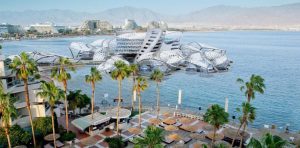
An artist captures the look of Eilat’s proposed underwater hotel.
Furthermore, the beach where the hotel will be located is currently a public beach and will close once the underwater hotel is built.
Prof. Ganin and other naysayers believe that in the long run Eilat will suffer from a socioeconomic standpoint. Instead of making money, the underwater hotel, which will probably only be an option for a small number of wealthy customers, is likely to take it away. Currently, the only underwater structure in the region is the popular Coral Beach Underwater Observatory in Eilat. But unlike the future underwater hotel, this observatory is open to the general public for a fee of 79NIS ($23) for adults and 69NIS ($20) for children. Plus, it received its building permit more than 40 years ago and currently operates in a nature reserve.
The developers for the planned underwater hotel are brothers Tzahi and Chen Neumann from the Alon Group. Construction of the hotel will reportedly cost 200 million shekels ($57 million). It will have somewhere between 82 and 106 rooms over an area of up to 25,000 square meters (270,000 square feet), according to reports. The project is supported by Eilat City Hall and the Tourism Ministry, which assured the media and the general public that it will preserve the reef.
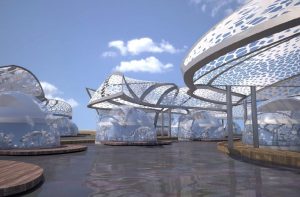
A three dimensional rendition of the proposed underwater hotel. Courtesy
Does Eilat need an underwater hotel?
With its sunny beaches, stunning coral reef, hot climate, luxury accommodations, and plethora of water activities, the busy southern resort town of Eilat has become one of Israel’s top vacation spots. Still, numbers have been on a downward spiral as the Central Bureau of Statistics reported that incoming tourism in the area between 1997 and 2015 collapsed by 83 percent. Still, the Tourism Ministry was optimistic about 2017 as the CBS reported that 26 percent more tourists visited Israel at the beginning of the year, than had in the corresponding period the year before. Many of those tourists went to Eilat.
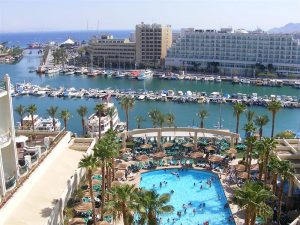
eilat via Lehava Kirya Malachi/Wikimedia
Ongoing reports say that while the height of tourist season notes packed beaches and hotels, the actual city is rather deserted. Business owners claim it is because hotel prices are high and visitors want to take advantage of the hotel they paid for, and not necessarily the city itself. The solution would be to create more attractions and upgrade the city.
Sign up for our free weekly newsletter
SubscribeAs Eilat is one of Israel’s most popular vacation spots for locals and tourists alike, it may be no surprise that the Tourism Ministry has supported the underwater hotel venture. It’s also not the first time it has supported such seemingly unusual ideas that could prove to be a success, or could easily fail in planning or construction stages.
There is still a website up for The Red Sea Star, the underwater bar, restaurant, and observatory that opened sometime in the late 90s. There were high hopes and a sense of optimism for this restaurant, which received press in The New York Times. It was built 5 meters (16 feet) below sea surface and 70 meters (230 feet) away from the shore and had to be entered via bridge. Oddly enough, it later operated as a strip club until it was finally shut down in 2012.
SEE ALSO: Top Vacation Destination: Israel Is One Of Harper’s Bazaar “Best Places to Travel in 2017
Other unconventional ideas in Eilat’s past included a biblical theme park that operated for 20 years until it was closed in 2015, and an IMAX cinema, which recently closed.
In March of last year, there was talk of building a large Disneyland-style amusement park on Kibbutz Eilot. The park would be called Aquaria and would include a huge mall and a variety of attractions. It would also employ 2,000 residents of the region a year. Alas, nothing has yet been decided.
The “uncomfortable” controversy behind Daniel Libeskind’s work
Will US-based architect Daniel Libeskind’s well-received, yet controversial reputation help or hurt the planned endeavor?
Libeskind may be a renowned architect with successful structures under his belt, but many of his projects have received a lot of flak from the public. He received criticism for his Jewish Museum in Berlin, for example, because his plans for the building did not resemble a conventional museum. The building, which was unveiled in 2001, is a sharp zigzag of a structure with voids that bring light into the galleries. It leads out to a Garden of Exile, where visitors stand among tall, foreboding concrete monuments. Libeskind told reporters that he doesn’t listen to criticism. His reasoning was that it’s a new era and architecture is different than what it used to be, that not all architects should conform to designs that fit expectations, and that a memorial should not be a comforting site, as it relates to a tragic history that is uncomfortable.
His plan for the World Trade Center memorial was also seen as “uncomfortable” because it was so different from the looming towers that once stood there. Libeskind was selected by the Lower Manhattan Development Corporation to oversee the rebuilding of the area. He opted to work at ground level and gave over half of his 16-acre land to public space, which later became the sunken memorial and David Brody Bond’s Memorial Museum, opening in 2014. The One World Trade Center skyscraper by Skidmore, Owings, & Merrill was completed in 2015.
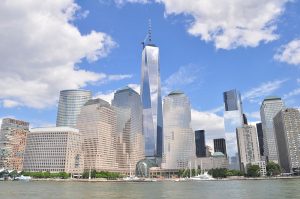
Today’s rebuilt World Trade Center complex envisioned by Daniel Libeskind via JMabel/Wikimedia
Investors decided not to go ahead with the Libeskind-led project to construct the Pyramid Tower on what was once the Eden Theater on Agrippas Street in Jerusalem, after they said in a statement that “the design requirements prevented them from implementing building rights.” The developer of the project faced opposition from the Society for the Preservation of Israeli Heritage Sites and the architects’ association.
Will the underwater hotel end up like Pyramid Tower? Eilat City architect Yisrael Hayun told Haaretz that the plan is still in the initial stages and has yet to be approved. “Everyone supports a new idea that will bring tourists to the city,” he says, “We understand there is a great sensitivity here.”
Photos: Courtesy, JMabel, Lehava Kirya Malachi
Related posts

Resilient And Nutritious New Plant-Based Milk Aims To Make A Splash

Chocolate From Cultivated Cocoa Comes Without Environmental Toll

Plastic Fantastic: Startup Takes PVC Back To Its Crude Oil Roots


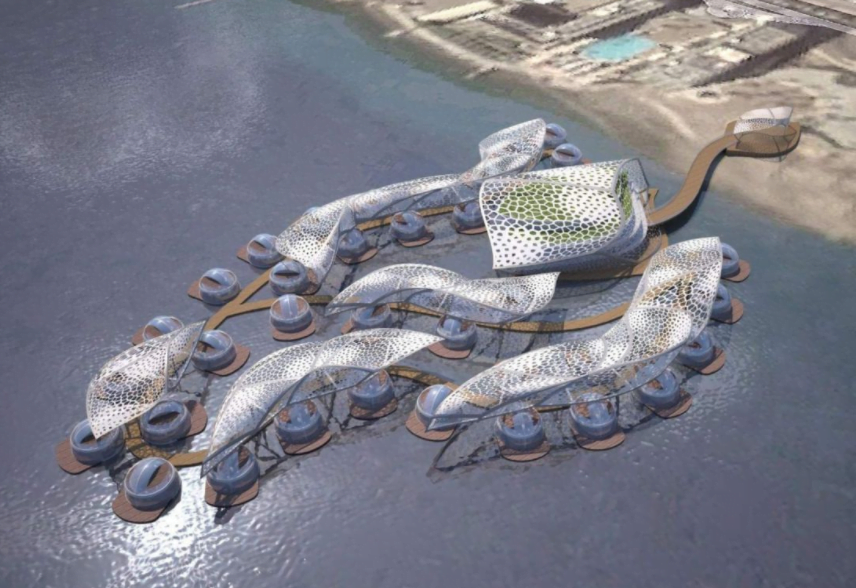

Facebook comments